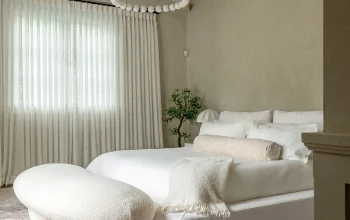Ever tossed and turned all night, only to wake up feeling like you barely slept? You’re not alone. In fact, about 35% of adults report getting less than the recommended 7 hours of sleep per night. But here’s the good news: smart bedroom technology is changing the game. From lights that mimic sunrise to mattresses that adjust to your body, let’s explore how tech can turn your bedroom into a sleep sanctuary.
What Makes a Bedroom “Smart”?
A smart bedroom isn’t just about gadgets—it’s about creating an environment that adapts to your needs. Think of it like a personal sleep concierge. Lights dim when it’s time to wind down. The thermostat adjusts so you don’t wake up sweating. Even your pillow might nudge you if you’re snoring too loud. Sounds futuristic? Well, it’s all available now.
Core Components of a Smart Bedroom
- Smart Lighting: Bulbs that change color temperature to match your circadian rhythm.
- Climate Control: Thermostats and fans that keep your room at the ideal sleep temperature (around 65°F, by the way).
- Sleep Tracking: Wearables or bed sensors that monitor your sleep stages.
- Soundscapes: White noise machines or smart speakers that drown out distractions.
- Automated Window Treatments: Blackout shades that sync with your alarm.
Smart Lighting: More Than Just a Dimmer Switch
You know how sunlight wakes you up naturally? Smart lighting replicates that. Brands like Philips Hue or Lutron offer bulbs that shift from energizing blue tones in the morning to warm, amber hues at night. Some even simulate sunrise—gradually brightening to ease you out of deep sleep. No more jarring alarm clocks.
Pro tip: Pair your lights with motion sensors. Walk to the bathroom at 2 AM, and they’ll glow just enough to guide you—without fully waking you up.
Best Smart Bulbs for Sleep
| Brand | Key Feature | Price Range |
| Philips Hue | Circadian lighting schedules | $50-$200 |
| Lutron Caseta | Works with smart shades | $60-$150 |
| Nanoleaf | Shape-shifting panels | $100-$250 |
The Perfect Sleep Temperature (Without the Arguments)
Ever fought over the thermostat with a partner who prefers Arctic-level cooling? Smart climate control solves that. Devices like the Nest Thermostat or BedJet learn your preferences and adjust automatically. Some even split the difference—cooling your side of the bed while leaving your partner’s untouched.
Fun fact: Studies show your core body temperature needs to drop slightly to fall asleep. Smart thermostats kick in about an hour before bedtime to help this process along.
Worth the Splurge: Smart Mattresses
Imagine a mattress that adjusts firmness based on your sleep position—or even your partner’s. Brands like Sleep Number and Eight Sleep do exactly that, with built-in sensors to track heart rate, breathing, and more. Yeah, it’s like sleeping on a tech-packed cloud.
White Noise, Pink Noise, and Everything In Between
City traffic, snoring, that one creaky floorboard—noise is the enemy of deep sleep. Smart sound machines like the Hatch Restore or apps like Calm offer more than just static. Try rainforest sounds, binaural beats, or even a custom mix of fan hum and distant thunder.
Little-known hack: Some smart speakers (like Amazon Echo) can detect snoring and gently nudge you to roll over—without waking you fully.
The Dark Side: Blackout Tech
Light pollution doesn’t just come from streetlights. Charger LEDs, laptop indicators—they all add up. Smart blackout shades (like those from Serena or IKEA) block 99% of light and can be scheduled to open at sunrise. For renters, temporary smart films like those from NDFOS stick to windows and tint on command.
Putting It All Together: A Nighttime Routine That Works
Here’s the deal—tech works best when it’s seamless. Try this automated wind-down routine:
- At 8 PM, lights gradually dim to warm tones.
- By 9 PM, the thermostat drops to 67°F.
- At 9:30 PM, your speaker plays a sleep meditation.
- When you climb into bed, your mattress adjusts to your preferred firmness.
- If you snore, your pillow vibrates softly (instead of your partner elbowing you).
Final Thoughts: Sleep Like It’s 2050
We spend a third of our lives sleeping—why not make it count? Smart bedrooms aren’t about gimmicks; they’re about solving real, frustrating problems. Whether it’s a $20 smart bulb or a high-tech mattress, the goal is the same: waking up feeling restored. And honestly, that’s priceless.



